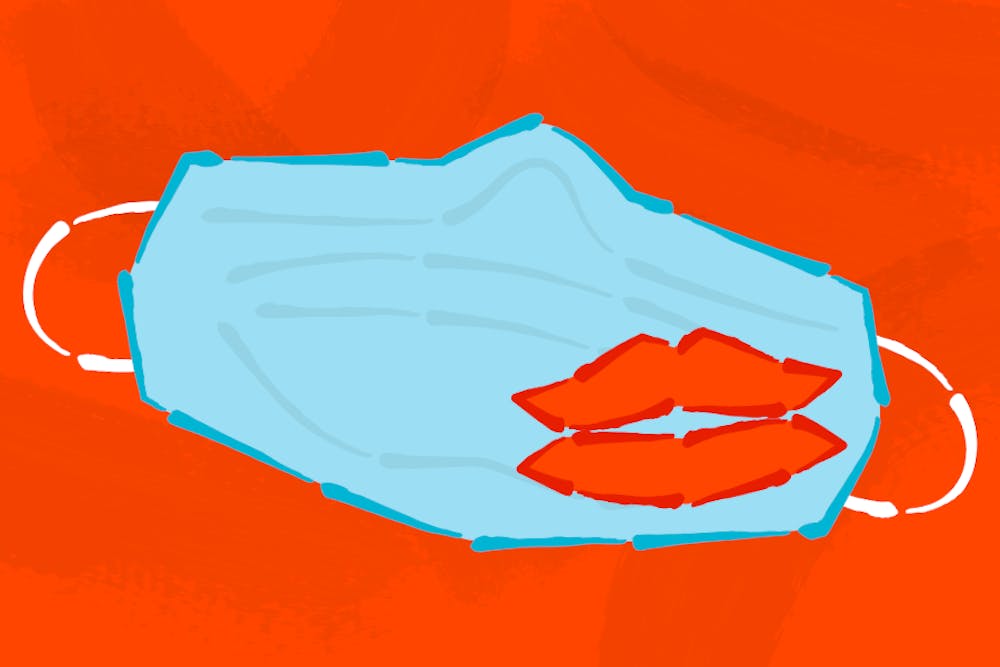People in budding relationships frequently field personal questions from new love interests. Getting to know someone requires an informal game of 20 questions—you spend so much time learning what things they care about. But the pandemic has given rise to a new first–date question that’s even more important: What precautions are you taking to limit your exposure to COVID–19?
Because everyone has a different threshold for risk, it’s important to have these conversations early on. Street spoke with two students about how these talks went and asked a therapist at Counseling and Psychological Services (CAPS) for advice on having what could be a tough discussion.
Lilah Katz (C '24) spent last fall in her hometown, experiencing her first semester of college through a computer screen. In early October, she was able to reconnect with a friend from high school who was also doing school virtually, and she eventually began dating her.
But the path to that relationship wasn’t easy. They FaceTimed and texted for two months before seeing each other in person for the first time, and even then, they were only able to meet outdoors while wearing masks. It wasn’t until December that they had their first in–person meeting after self–isolating for two weeks.
While Lilah wanted to see her girlfriend sooner, her girlfriend’s parents weren’t comfortable welcoming Lilah into their bubble at a time when case numbers in their community were at an all–time high. There was a long series of conversations—some with just the couple, others with their parents included—trying to find a solution that everyone could agree on. But there was nothing aside from a full quarantine that would quell their parents’ anxieties about spreading the virus.
Lilah feels like the inability to see each other in person for so long slowed the pace of their relationship. “Can you call someone your girlfriend if you haven’t kissed?” she asks. But at the end of the day, their biggest concern was making sure that everyone was safe—even if it meant waiting longer to finally have that first kiss.
Derek Nheiu (W '23) also had a conversation about COVID–19 safety with his girlfriend, whom he began dating last fall, but he says the process went rather smoothly. He was living off–campus last semester while his girlfriend was at home in Virginia with her family. They were able to work out a system of testing and isolating so they could see each other about once a month.
“I was testing a week before every time I came,” Derek says. “I'm pretty afraid of COVID–19, so I was essentially social distancing and quarantining and isolating myself for the most part unless I needed to go out and run errands.”
This made it easier for his girlfriend and her parents—who needed to be especially careful because of their jobs in the military—to welcome him into their home once a month.
Even with precautions, Derek got sick in November. He realized far enough in advance to cancel his plans to visit his girlfriend that week, but it was a big scare. The system they had devised was able to catch an issue before it arose, which meant it was working like they had hoped.
As far as the conversation itself, Derek says that the whole thing was surprisingly normal. “I know some people may feel awkward or weird talking about something like that, but for us, it was very much a given,” he says. “We had to be safe.”
If hearing these students’ stories made you realize that you want to have a conversation with your partner about COVID–19 safety, especially given the recent uptick in cases on Penn’s campus, here’s some advice from CAPS clinician Eddie Burks, who specializes in relationship conflict.
“When you're having conversations about COVID–19 and relationships, the first thing you have to do is be very honest and open,” Burks explains. “You really want to make sure that you're being understood, and you're also understanding the other person.”
This can be especially important if you have different risk tolerances or definitions of responsibility. It’s crucial to be aware that you might not agree coming into the conversation, but that you’ll need to come to a mutual understanding that respects the needs and boundaries of everyone involved.
Burks likes to categorize these needs and boundaries into “compromisables” and “non–compromisables”—meaning that there are certain things that you might be open to, but others that you aren’t. For example, you might be willing to see your partner unmasked once a week if you both get tested and self–isolate for a couple of days, but not if they’re seeing several other people right before they meet up with you. You might be okay with an outdoor picnic but not an indoor dinner.
There’s no right answer to any of this. It’s a difficult conversation that hinges upon two people’s risk tolerances, which might be different depending on a number of circumstances—case numbers in your community, immunocompromised roommates, and your general willingness to expand your bubble.
Ultimately, the decision is as much about your mental well–being as it is about your physical health. As Burks says, “Part of the compromisables is how much more stress are you willing to take on?”
Whether you decide on an elaborate testing and quarantining system like Derek and Lilah, a Zoom–only relationship, or something entirely different, we hope these stories and tips will help you navigate an unusual dating scene.







